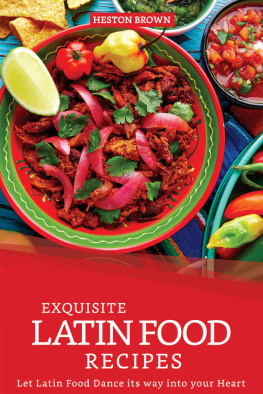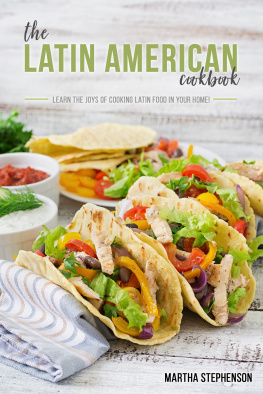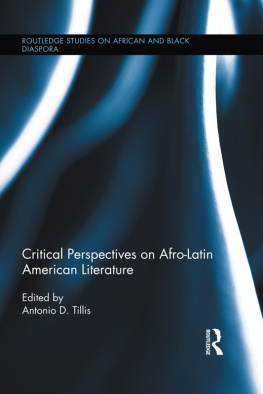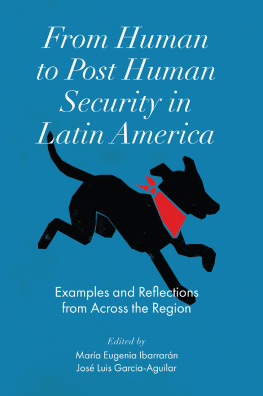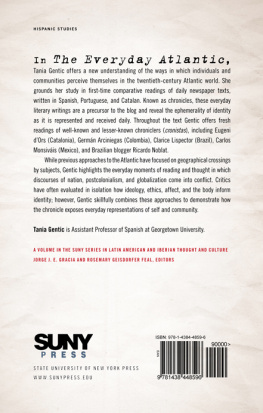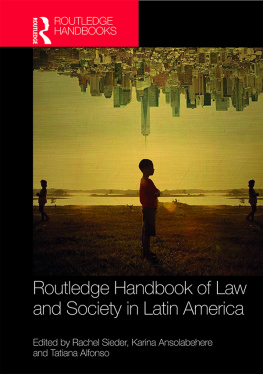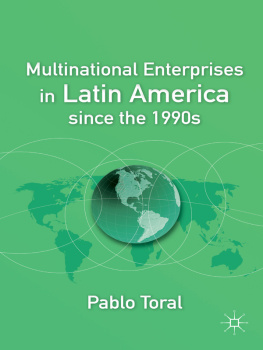2020 by Vanderbilt University Press
Nashville, Tennessee 37235
All rights reserved
First printing 2020
This book is printed on acid-free paper.
Library of Congress Cataloging-in-Publication Data
Names: Climent-Espino, Rafael, 1977- editor. | Gmez-Bravo, Ana M. (Ana Mara), editor.
Title: Food, texts, and cultures in Latin America and Spain / Rafael Climent-Espino and Ana M. Gmez-Bravo, eds.
Description: Nashville : Vanderbilt University Press, [2019] | Includes bibliographical references and index. | Summary: Approaches Hispanic and Latin American food from the perspective of literary and cultural studies. Fourteen essays apply a food lens to colonial studies, ethnic and racial studies, gender and sexuality studies, and studies of power dynamics, nationalisms and nation building, theories of embodiment, and identityProvided by publisher.
Identifiers: LCCN 2019031046 (print) | LCCN 2019031047 (ebook) | ISBN 9780826522818 (hardcover) | ISBN 9780826522825 (paperback) | ISBN 9780826522832 (ebook)
Subjects: LCSH: Food in literature. | Cooking in literature. | Latin American literatureHistory and criticism. | Spanish literatureHistory and criticism. | Food habitsLatin America. | Food habitsSpain. | CookbooksLatin AmericaHistory. | CookbooksSpainHistory.
Classification: LCC PN56.F59 F685 20194 (print) | LCC PN56.F59 (ebook) | DDC 641.30098dc23
LC record available at https://lccn.loc.gov/2019031046
LC ebook record available at https://lccn.loc.gov/2019031047
This study was supported in part by funds from the Vice Provost for Research at Baylor University.
INTRODUCTION
Food Studies in Latin American and Spanish Contexts
Ana M. Gmez-Bravo and Rafael Climent-Espino
A GROWING INTEREST IN food studies, particularly in relation to economic, environmental, political, and cultural issues, has translated into a large number of publications across a wide range of venues. From books such as Marion Nestles Food Politics or Michael Pollans The Omnivores Dilemma to the Slow Food movement, popular academic journals such as Gastronomica, Food and Foodways, and Food, Culture, and Society, and city-specific periodicals such as Edible Communities, food consumption choices are understood to have enormous impact on the environment, the socioeconomics and from an interdisciplinary perspective in the studies collected by Montserrat Piera and ngeles Mateo del Pino and Mara N. Pascual Soler, all of which correctly warn against trivializing a focus on food in academic humanities research.
From a curricular perspective, the rise of food studies programs in university structures and curricula clearly shows that food is a junction where diverse disciplines in the humanities, social and natural sciences, health and nutrition, and medicine can meet and begin productive dialogues and collaborations. The critical paths that lead from such intersections point to an exciting role for the humanities by creating a widening interest in interdisciplinary research and collaboration, for which scholars such as Warren Belasco have made a compelling case. As Lorna Piatti-Farnell and Donna L. Brien point out in the introduction to The Routledge Companion to Literature and Food, university courses on food fill up quickly, posing a strong pedagogical platform from which to engage students across disciplines, as well as presenting the humanities in a synergistic way with other fields. The role of the humanities in food studies goes beyond the analysis of mimetic representation to become a critical player in the disciplinary intersectionality at the core of food studies. At a time when the disconnect between people and the soil has grown to reportedly unprecedented levels, the study of food, texts, and cultures can contribute valuable insights to food studies, and the humanities can make a significant impact, adding meaning, creating content, and engaging powerful analytical lenses. An exciting related development is the incorporation of food topics into the Spanish curriculum, an increasingly popular addition to Spanish courses made easier by the recent publication of textbooks on Hispanic food and culture geared toward students enrolled in secondary and higher-education Spanish classes (Gmez-Bravo, Comida).
Anthropological approaches were among the first to produce important studies on food and culture and food history. Susan Bordo, Mary Douglas, Margaret Mead, Paul Rozin, and others opened exciting new vistas that placed food at the center of social, religious, ethnic, and literary practices. In The Raw and the Cooked, structural anthropologist Lvi-Strauss used binary oppositions in sociocultural analysis, later drawing a culinary triangle that presented cooking as a language based on unconscious structures, borrowing elements of language analysis: Thus we can hope to discover for each specific case how the cooking of a society is a language in which it unconsciously translates its structureor else resigns itself, still unconsciously, to revealing its contradictions (The Culinary Triangle 595). Social anthropologist Mary Douglas highlighted the symbolic power of food prohibitions and their role in the creation of boundaries. From the standpoint of cultural materialism, Marvin Harris pinpointed the adaptive needs that weigh into food choice and religious food prohibitions. He viewed culture as influenced by the material conditions from which it arises and put forth a functionalist explanation for food-centered religious laws. In her chapter included in this volume, Ana M. Gmez-Bravo analyzes the combined efforts of medical theory, religious belief, and Church doctrine in channeling an understanding of food as racialized marker. In Distinction, Pierre Bourdieu approached food from the standpoint of class and developed the concepts of habitus, or acquired dispositions, and cultural capital, exploring their role in the formation of taste in reference to art, music, and gastronomy. Bourdieus sociological emphasis, as well as the important issues raised by anthropologists, would resonate with many scholars working from a variety of fields and looking to examine the implications of combined biological and cultural approaches to food studies.
Other critics such as Michel de Certeau pointed to the limits of a purely sociological study that leaves out the individual practices and appropriations that take place in the everyday. In a related development, the study of the everyday and the material, which had thus far seemed to fall outside the study of culture, received a boost from social historians linked to the Annales School. A prominent such historian, Fernand Braudel exemplified the productive results of a combined study of components of daily life, such as food, with social and economic considerations. In a similar vein, through a millers particular cosmovision of a universe constituted by cheese and worms, Carlo Ginzburg presented a way to look at history through a microhistorical lens that emphasizes culture and a study of mentalities and subaltern cultures. Also using a historical outlook, Massimo Montanari illustrated the cultural nature of all food-related actions. Jack Goody similarly emphasized the intertwining of culture and the material world, particularly in relation to the shaping action of technologies. Following in Goodys footsteps and using a historical scope, Sidney W. Mintz showed how the study of one food commodity, sugar, could help explain major changes in industrial and capitalist systems. In


